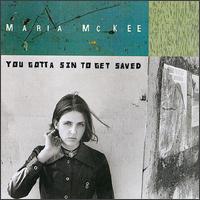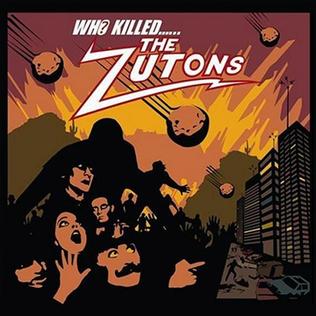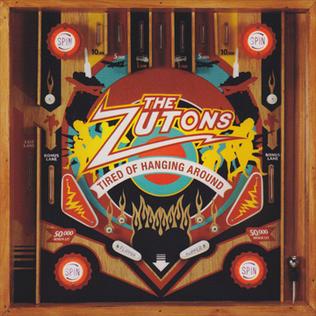
Primal Scream are a Scottish rock band originally formed in 1982 in Glasgow by Bobby Gillespie (vocals) and Jim Beattie (guitar). The band's current lineup consists of Gillespie, Andrew Innes (guitar), Simone Butler (bass), and Darrin Mooney (drums).

The Verve were an English rock band formed in Wigan in 1990 by lead vocalist Richard Ashcroft, guitarist Nick McCabe, bass guitarist Simon Jones and drummer Peter Salisbury. Guitarist and keyboard player Simon Tong later became a member in their first reunion only.

Urban Hymns is the third studio album by English rock band the Verve, released on 29 September 1997 on Hut Records. The group had broken up while promoting A Northern Soul in August 1995, though they reformed two weeks later without guitarist Nick McCabe. Frontman Richard Ashcroft moved to Bath, Somerset, where he made demos; Simon Tong joined the group soon afterwards. Following aborted recording sessions with producers John Leckie and Owen Morris, the band sought a new guitarist, contacting former Suede guitarist Bernard Butler, who played with them for a week before departing amidst creative differences. In 1996, The Verve started recording at Olympic Studios in London, first with producer Martin "Youth" Glover, followed by engineer Chris Potter. Ashcroft contacted McCabe in early 1997, inviting him back into the band, which McCabe accepted. Several songs were re-recorded to allow for the inclusion of McCabe's guitar parts, with sessions continuing into May 1997.

Loveless is the second studio album by the Irish-English rock band My Bloody Valentine. It was released on 4 November 1991 in the United Kingdom by Creation Records and in the United States by Sire Records. The album was recorded between February 1989 and September 1991, with vocalist and guitarist Kevin Shields leading sessions and experimenting with guitar vibrato, non standard tunings, digital sampling, and meticulous production methods. The band recorded at nineteen different studios and hired several engineers during the album's prolonged recording, with its final production cost rumoured to have reached £250,000.

A Northern Soul is the second studio album by English rock band the Verve, released on 3 July 1995 through Hut Records. With the tumultuous promotion for their debut studio album, A Storm in Heaven (1993), combined with their friends in Oasis becoming popular, relationships between members of the Verve became strained. After connecting with Oasis producer Owen Morris, the Verve went to a rehearsal space in Wigan to write material for the next album, which they recorded at Loco Studios in Wales. The sessions gained notoriety for the stories that emerged from the time, including Ashcroft going missing for five days and him allegedly totalling a car on the studio's lawn. In the first three weeks, they had finished 15 tracks; after this point, the situation soured as guitarist Nick McCabe grew exhausted from dealing with the other members frequently partying and taking ecstasy, in addition to vocalist Richard Ashcroft and Morris screaming and destroying objects. Eventually, McCabe had a different working schedule from the others, starting at 10–11 a.m. while the rest of the band started at 6 p.m.

Kevin Patrick Shields is an Irish musician, singer, songwriter, and record producer, who achieved international fame as the lead vocalist and guitarist of the alternative rock band My Bloody Valentine. Their studio albums Isn't Anything (1988) and Loveless (1991) established Shields as a pioneering figure in the shoegaze genre. His texturised guitar sound and his experimentation with his guitars' tremolo systems resulted in the creation of the "glide guitar" technique, which became a recognisable aspect of My Bloody Valentine's sound, along with his meticulous production techniques.

The Coral are an English rock band, formed in 1996 in Hoylake on the Wirral Peninsula, Merseyside. The band emerged during the early 2000s. Their 2002 debut album The Coral, from which came the single "Dreaming of You", was nominated for the Mercury Music Prize and listed as the fourth best album of the year by NME. Their second album, Magic and Medicine (2003), produced four UK Top 20 singles, including "Pass It On". In 2008, after guitarist Bill Ryder-Jones left the band, they continued as a five-piece.

The Zutons are an English indie rock band, formed in 2002 in Liverpool. The band are currently composed of singer, songwriter, and guitarist Dave McCabe, drummer Sean Payne, and saxophonist Abi Harding.

You Gotta Sin to Get Saved is the second album by the American singer-songwriter Maria McKee, released in 1993. The album includes two Van Morrison covers and a take on Goffin/King's "I Can't Make It Alone". The first single was "I'm Gonna Soothe You", which peaked at No. 35 on the UK Singles Chart.

A Storm in Heaven is the debut studio album by the English rock band Verve, later the Verve, released on 21 June 1993 on Hut Records. The band had formed between school friends vocalist Richard Ashcroft, bassist Simon Jones, and drummer Peter Salisbury, with guitarist Nick McCabe joining shortly after. After a show in London, they signed to the Virgin Records imprint Hut Records in 1991, which released their first three singles in 1992. Following the appointment of the company Savage and Best as their management, the band recorded their debut album at Sawmills Studios in Cornwall with producer John Leckie. Referred to mainly as a psychedelic album, A Storm in Heaven was largely written in the studio.
Mountaineers is a Welsh pop group, consisting of founding members Alex Germains, Ceri James, and Tomas Kelar. Having been discovered by Deltasonic founder Alan Wills, they were the first act to sign to the record label Deltasonic, home of Liverpudlian bands The Coral and The Zutons. The group produced all their own music.

Who Killed...... The Zutons? is the debut studio album by the English rock band the Zutons, released via Deltasonic on 19 April 2004. The album's last known sales are that of 581,088 as of July 2006.
The Little Flames were an indie rock band from Hoylake, England. The band consisted of Eva Petersen (Vocals), Greg Mighall (Drums), Joe Edwards (Bass), Miles Kane (Guitar) and Mat Gregory (Guitar). Their music can best be described as indie rock with some 1960s inspiration, slightly similar to The Coral. Fans of the band include Arctic Monkeys, who could be seen wearing Little Flames T-shirts at concerts at the Astoria in London. The band has played shows with bands such as the Arctic Monkeys, The Coral, The Dead 60s and The Zutons.

Tired of Hanging Around is the second studio album by the British rock band The Zutons, released in the UK on 17 April 2006. Produced by Stephen Street, the album was recorded at Townhouse and Olympic Studios in 2005. The album charted at 2 on the UK album charts.

"Valerie" is a song by English indie rock band the Zutons from their second studio album, Tired of Hanging Around (2006). The song was later covered by Mark Ronson, with lead vocals provided by Amy Winehouse, reaching number two on the UK Singles Chart in 2007.
George Drakoulias is a Greek-American music producer and a former A&R executive at the American Recordings label. He is often considered a protégé of Rick Rubin.

David Alan McCabe is an English singer, songwriter and guitarist, the frontman of The Zutons and a former member of Tramp Attack.

Roots & Echoes is the fifth studio album by English rock band the Coral. It was released on 6 August 2007, through Deltasonic. During the promotional cycle for their third studio album The Invisible Invasion (2005), guitarist Bill Ryder-Jones left and subsequently re-joined the band. Recording for their next album occurred between August 2006 and February 2007 at three different studios, Wheeler End, Konk, and RAK. Craig Silvey and the band co-produced the majority of the material, aside from two songs that were produced by Ian Broudie. Described as a psychedelic rock and pop album, Roots & Echoes took influences from doo wop and R&B.

"I'm Gonna Soothe You" is a song by American singer-songwriter Maria McKee, released in May 1993 by Geffen Records as the lead single from her second studio album, You Gotta Sin to Get Saved (1993). The song was written by McKee, Marvin Etzioni and Bruce Brody, and produced by George Drakoulias. It reached No. 35 in the UK and remained on the UK Singles Chart for three weeks. The accompanying music video was directed by English film, documentary and music video director Julien Temple. It achieved play on Power Play Music Video Television and VH1.

The Big Decider is the fourth studio album by English rock band the Zutons, released on 26 April 2024 through Icepop. It is the band's first album in 16 years, following You Can Do Anything (2008), their disbandment the following year, and reformation in 2018. The album was produced by Ian Broudie, Nile Rodgers, and band member Sean Payne and was promoted with a tour of the UK in early 2024. It received generally positive reviews from critics.

















